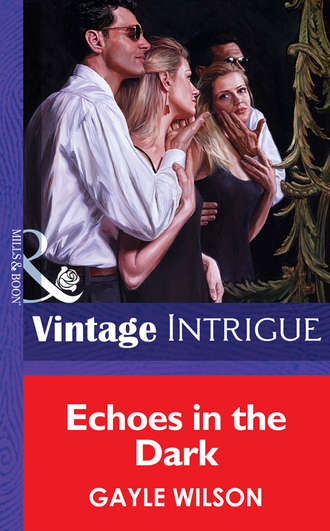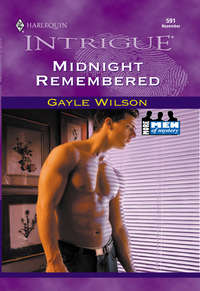
Полная версия
Echoes in the Dark
“I thought that would be easier than the truth,” his brother’s voice spoke quietly. Julien could hear the bitter resignation behind the calm answer. “I knew how much it would hurt you to know the truth.”
“Hurt more than the belief that I let my wife and son burn to death? What truth could have twisted my guts all these years more than that?”
“No one blamed you for her death. No one could believe you’d even reached the car in your condition. The idea that you’d failed her was only in your head. She was the one driving, too fast, as she always did. Everyone at the reception had seen the beginnings of that tantrum, and, of course, she’d been drinking.”
“She didn’t drink. She was pregnant.”
“Maybe that’s what she told you, but she had. Too many people saw her. Several came forward at the inquiry. She was drunk and angry and she killed her child and almost killed you. The only fault is hers. I never knew you blamed yourself. If I had known, I would have told you a long time ago, but I thought it would be kinder to have you believe—”
“Kinder to believe that she burned to death? My God, Andre, what could have been worse than that?”
“That she killed her son, blinded you and then walked away. She chose to leave. At least—”
“Are you telling me she wasn’t injured?” he interrupted. “Are you trying to tell me she just walked away from the wreck?”
“She tried to get help,” his brother’s voice said, attempting, he thought, to be fair. “She tried to flag down a car, but they thought she was drunk. Someone found her wandering down the road. She had a head injury. She was disoriented. She thought you were dead. They brought her to the hospital, but when she found out you were alive and so badly hurt, and that she’d left you there... She was so frantic that they thought, for the baby’s sake, she should be taken somewhere where she could be cared for. I don’t know who thought of the convent, but it seemed the best solution. She didn’t want to leave you, and she was in no condition to wait through the hours of surgery. She needed to be under observation, but when they tried to make her leave you, she got hysterical. Finally they gave her a shot, a sedative, and she was taken to the convent. Perhaps that was a mistake—”
Andre paused, took a deep breath and then admitted, “As it turned out, it was, of course, a terrible mistake, but everything was so confused, and she’d shown no signs of going into labor. It was far too early. Moving her seemed to make sense at the time.”
Andre stopped. Julien could hear the sigh, but he had to know it all.
“Go on,” he said bitterly into the silence. “Tell me about my son’s death. Explain that lie.”
“The baby was born prematurely. There at the convent. By the time the doctor arrived... He said it wouldn’t have mattered. Even if they had been in hospital, they couldn’t have saved the baby. It was too early. The baby was stillborn. I swear to you that’s the truth.”
“And then? Did my wife bleed to death there where you’d sent her? Is that what you’ve been afraid to tell me all these years. That she died because she wasn’t where she could get medical attention? Was that your decision, Andre?”
There was no answer for a long time and he waited, impassive now. Was it less painful to believe that the fault had not been his? Less painful to picture her gradually sinking deeper into a bloodless lethargy from which not even the doctor, when he arrived, could save her? Better than the images of the fire and the smell of the gasoline?
Even now he couldn’t stand the smell. It was like the smell of a hospital. He couldn’t enter one. It brought it all back again: the agony of the burn tank, the struggle to walk again, to cope with the blackness of his world that had threatened so often to drown him in its dark depression.
“She didn’t die.”
The words interrupted his return to the hell of those memories, and he felt his heart take a great leap as he realized what Andre had just said. He forced himself into stillness and waited, and finally his brother continued.
“She recovered. I don’t know where the old woman got the idea that she was dying. She recovered more rapidly than anyone believed possible, but she was very young and strong. She came to the hospital to see you as soon as she was able. I’ll give her that. She had good intentions, but...I suppose the shock was too great. You were so terribly hurt, and there was no response for so long. When the doctors told us the full extent of the injuries, she blamed herself, of course. She damn well should have,” Andre said harshly. “That stupid bitch and her everlasting tantrums. She put you there, and as soon as the doctors told us the truth about your condition...that you were blind and probably would never walk again. That you—”
“I know what the doctors said,” Julien interrupted. He allowed himself to ask only when the angry voice had been silent a long time, “And when she knew?”
“She left. She left the note on your bed, in an envelope with my name on it. She couldn’t live with what she’d done. She couldn’t live with you as you were going to be. As soon as you came out of the coma, she realized that you were going to live, to know what she’d done. I could have killed her, Julien. I swear if I’d found her, I would have. The damned coward did what she did and then left you to—”
“So you let me believe she died?” the passionless voice interrupted again.
“You woke up convinced she was dead. All your questions were about her death, about whether she’d suffered. The doctors were so concerned about you, not just the physical injuries, but— I didn’t know what to do, what would be kinder to do, so I just said nothing. I’m guilty of that, and I admit it. I chose to let you believe that she died, rather than to know that she blinded you, killed your son and then walked away. All those months I watched you struggle through the pain, I hated her. I never tried to find her because I knew I’d kill her. I could kill her now.”
He could hear the conviction in the quiet voice.
“Do you swear to me that this is, at last, the truth? Do you swear it, Andre?”
“It’s the truth. Why would I lie to you after all this time? Perhaps I made the wrong decisions, but at least I tried. At least, I didn’t run away.” Seeing the pain in his brother’s dark face, Andre whispered, “I’m so sorry.”
Julien took a deep breath, forcing himself to calmness. “I think it’s best that we don’t talk about this again. It’s very painful for me, Andre. I hope that what’s been revealed today won’t be mentioned again. Will you agree to that?”
“Of course. I’ll do whatever you want. I never intended to hurt you more. You were already—”
“I know. Let it go. There’s nothing you can do after all these years. Let me learn to deal with this. It’s simply a different ending to an old story. Now if you’ll forgive me...” The words were polite dismissal, and in spite of so many things he wanted to say, Andre was forced to recognize that what had been said was enough for the moment, all that the man who sat so calmly in his prison of darkness could deal with, and so he left.
When the door closed, Julien rose and went to stand by the window. He removed the dark glasses and raised his face into the warmth of the sun, trying to think about what he needed to do, and none of the possibilities were pleasant.
* * *
THE INTERVIEW HAD GONE more easily than she had anticipated. The elegant and expensive office had intimidated her at the beginning, but the lawyer had been very kind. He had gone over her résumé with polite interest, not even glancing at the letters of reference she’d handed him. She had been sure that she wouldn’t be called in when she had seen the mob in the outer room. The women waiting there had looked as formidable as the suite of offices they all had been asked to come to for the interviews.
She had dressed carefully, but her suit was not of the same quality that several of the applicants who had entered his inner sanctum before her had worn. However, he had never even glanced at her suit or the carefully polished shoes, her only pair of real leather ones. He had been far more interested in her background, in whom she had worked for and her education. Her limited schooling was another weak point she had attempted to present in as strong a light as was possible. Then he had asked the question she had dreaded from the beginning.
“There’s a time period here that is unaccounted for professionally, Ms. Evans. If there’s a problem, then it is far better to let us know now than to have it turn up in our later investigations. The truth is always better coming from your own lips,” he said gently, like her grandfather.
She smiled at the sudden mental comparison to the old man who had instilled in her his values. He had tried so hard to make her whole, to repair the ravages of her parents’ failures. He had given her the only home she had ever known, a sanctuary from that pain in the small, peaceful village he had taken her to. Simply thinking about him gave her courage, so she was able to answer calmly, “A problem? As if I were dismissed for failing in some way to satisfy my employer? That sort of problem? Then, no, I assure you that’s not the explanation.”
“And?” he said, waiting.
She should have known she wouldn’t be able to fob him off. The gray eyes were also, like her grandfather’s, far too shrewd. She had never been able to hide from the old man’s keen insight. He had seen into the depths of her soul. If only he had been there when she finally came out of the long darkness, she thought again with regret.
“I was ill. For a long time. An illness caused by depression.”
The lawyer spoke only when it was evident she had nothing else to add. “I’m sorry. I didn’t intend to bring back unpleasant memories. I apologize for forcing you to talk about that time.”
“It’s all right. There are no unpleasant memories of ‘that time.’ No memories at all—” She stopped, and then tried to explain the unexplainable. “Whatever caused the depression, whatever trauma, I’ve forgotten. Blocked or repressed it, the doctors said.”
“You’ve never remembered?” he asked softly, wondering if this was the key to what he had been ordered to do.
“My childhood. Growing up.” She paused, the bleakness of the memories that had returned affirming that the ones her mind still denied must be much worse. She continued finally, telling him a truth she never talked about. “Then...” she whispered, “there’s just a void. Whatever happened to cause that blackness, I’ve never remembered, and now they believe I won’t. My mind doesn’t want me to.” She didn’t tell him about the punishing headaches that were the price she paid for trying to delve into that emptiness, to find those lost memories.
Instead, she forced herself to speak more strongly, with a confidence she was far from feeling. “As you can see, that was a long time ago. All my references are since that period. My amnesia doesn’t affect my work. It’s better, perhaps, that I can’t remember whatever happened.”
“I’m sorry,” he said again, and she thought that he did regret forcing the painful admission.
“I’ve learned to expect the question. Some interviewers assume...all sorts of things. Being fired and wishing to hide it is only one of the scenarios they imagine.”
“Have you had so many interviews? Your skills seem more than adequate.”
“No one seems to need a permanent bilingual secretary whose skills are, by today’s standards, as we both know, merely adequate. The larger corporations are looking for someone whose training covers a broader range of computer knowledge. My training was of a different sort.”
“Yet it seems very suited to the position we have in mind. Not one of the other applicants I’ve seen today has a Swiss finishing school in her background.”
“I spent five years there. Not that it’s done me much good,” she admitted, smiling. “Most people think that only means I’m qualified to be some minor diplomat’s wife and not much else.”
“Or someone’s social secretary,” he suggested, and she knew then he was seriously considering her for the position. She dared, for the first time, to hope.
“I haven’t done that before, but I’m sure I can.” She was pleased that she could hear the conviction in her own voice.
“There are, however, several conditions that you’d have to consider if we decide to offer you the position.”
“What kind of conditions?” she asked carefully. She had known there was a catch to this. It had smelled too good to be true, had smelled from the beginning of fine leather and old money.
“For one thing, it would mean a relocation. My client lives on an island in the Îles des Saintes. It’s a rather isolated situation for someone as young and attractive as you.”
“Excuse me,” she said, smiling at him again. “I told you my education had been lacking in all but the social skills. The Îles des Saintes?”
“They are part of the Lesser Antilles. You would be working on one of the smaller islands, privately owned by Madame Rochette’s family. She’s living there to recover from the recent death of her husband, after a prolonged illness. You would be not only her secretary but, I suppose, a companion. She’s not so many years older than you, I should imagine.” He glanced at her résumé and then at her face, and she saw the swiftly hidden surprise.
“I’m twenty-five,” she said quietly, knowing that she looked older. Something in her eyes, people often told her, not intending to be unkind.
“Then more than I believed, but still the difference between thirtysomething and twentysomething isn’t so great,” he said. “Would you be willing to relocate for an unspecified time? Or do you have commitments here in Paris that would make that impossible?”
“I have no commitments, no ties of any kind. I am literally the most uncommitted person you are ever likely to meet.”
She laughed softly at the reality of that, and when she saw he didn’t understand, she shook her head to reassure him.
“I’m sorry. That’s not really funny.” She realized she was about to blow it, to miss this opportunity, so she tried again. “I’m very interested in the position. I would have no problem in relocating, and I think your client will find I have the skills to handle her social correspondence and her companionship. I hope I’ll have the opportunity to meet her and convince her of my qualifications.”
“I’m sorry. I thought you understood that I’m to make the decision. Madame Rochette prefers not to return from the Caribbean. I’ll be in touch, whatever the outcome of the other interviews. Thank you for your time.”
“Thank you. I hope...” She paused, trying to keep the desperation hidden. “How long before you’ll have reached your decision?”
“We’ll decide within the next few days. I have your number.”
She could think of nothing else that she might tell him to convince him of her qualifications, so she rose, walking from his office with the grace taught at that expensive finishing school her grandfather had finally rescued her from.
The solicitor tented his fingers, appearing to study the file before him, but his mind was on what the woman had told him. He knew she was perfect. It all fit. However, the one who would have the final say on that had not yet been consulted, so he pushed himself to his feet like an old man and moved to the open door that she had apparently never noticed in the deliberate dimness of the office.
His client was seated in a high-backed chair just beyond the open doorway. The solicitor walked around the chair and stood for a long time facing the tall, dark figure. The smile that played around those lips was not a display of pleasure or amusement. He wondered again about the purpose of this search that had involved his staff now for more than a year.
“Well?” he asked finally and watched the smile broaden.
“You’ve done very well, Beaulieu, very well, indeed.”
“She fits every qualification you gave me. Will she do? Is she what you wanted?”
“She is exactly what I wanted.” The man in the chair controlled the triumph in his voice with an effort. “You understand the necessity of complete confidence.”
“That’s always our policy. You’ve depended on us in the past. Have we ever given you cause to question our integrity?”
The listener could hear the stifled anger in the lawyer’s voice, but he was paying him enough to put up with a few insulting questions. It was vital that no one should be able to trace her here or to him.
“Does she look like the picture I gave you?” he asked suddenly, surprising himself by his curiosity. He wasn’t sure he wanted to hear the answer, but when it came, it was only what he had expected.
“Their mothers couldn’t tell them apart,” the solicitor said. There was no pleasure over the success of the search in his voice, only regret for the woman. He had found himself liking her quiet, self-effacing humor. He didn’t, however, ask any of the questions that stirred darkly in his mind. That wasn’t part of his job. He had done what he had been paid to do, and any misgivings he had he would keep to himself, but he didn’t envy the woman he had found. He already knew far more about all this than he wanted to, far too much for his own peace of mind.
Chapter Two
The flight to Guadeloupe had been restful. There was something to be said for flying first class and being waited on. It was an experience she thought she could grow accustomed to. All she needed were a few more opportunities to try it, she thought in amusement.
The call had been unexpected in spite of the approval she had sensed in the lawyer’s attitude. She had learned in the past few years not to expect anything good. She would have rejected that thought as self-pitying, would never have consciously allowed it to form, but it was true, and it colored her view of the world. The offer of this job had been, to her, truly a miracle.
She watched the islands unfold below the plane in a seemingly endless chain of green dots rimmed with the white pearl of surf against an iridescent shimmer of blues. The scene looked like something out of a travel film, except she was here. She was to be the social secretary to a wealthy widow whose family owned an island. She smiled at the image of herself in that setting, but the reflection in the plane’s window mocked her doubts. She certainly looked as if she belonged.
She had put her long, sun blond hair up today and had worn more makeup, in hopes, she supposed, of making a good impression. She had even bought a new dress—an emerald linen, very businesslike, except for what it did to the green of her eyes. There would never be anything businesslike about her eyes.
She had followed to the letter the lawyer’s instructions about what to pack. She had also read the friendly note from her future employer so many times the paper threatened to come apart at the folds. It had been reassuring, warm and inviting. Of course, Madame Rochette had been under no obligation to write at all, so the gesture seemed to indicate that she would probably enjoy their relationship as much as she hoped. She tried not to, but she found that she was, indeed, hoping that this all would work out to be as pleasant as it seemed.
The lawyer had given explicit instructions about arrangements for reaching the island, including travel from the airport, ferry times, an endless list of minutiae that she also intended to carry out to the letter. She was surprised to find, however, that when she came through customs and presented her passport, there was an immediate flurry of officialdom that led her eventually to the door of a private office while her escorts went rushing off to find her bags. She followed their instructions, entering the office to find it occupied by someone quite different from the officials she had encountered so far.
“Ms. Evans?” he asked, unfolding his long body from the leather chair. He had been reading a newspaper, comfortably invading someone else’s office with a tall, cool-looking drink within arm’s reach. A tropical-weight tan jacket draped broad shoulders and fell loosely to his narrow hips. The lean length of the legs below was emphasized by the skintight and well-worn jeans he wore. His hair was darkly curling and long by current standards. It fell below the collar of the jacket, but on him it looked right, finished the picture of a man who was perfectly at ease with the persona he had chosen, perfectly suited for the tropics. He was, of course, deeply tanned, the contrast as sharp between the crystal blue of his eyes and the dark gold of his skin as it was between the flash of white, even teeth in the smile he gave her.
“You are Caroline Evans?” he said. “My reputation won’t stand an attempt to pick up some strange woman at the airport.”
I’ll just bet it won’t, she thought, but she smiled, extending her hand to reassure him. “I’m Caroline Evans.”
“Andre Gerrard,” he said. His handshake was pleasantly firm and brief. “My sister asked me to meet you. Our transportation arrangements can be a little confusing for someone not born to boating everywhere. She asked me to take you to the island. I have my boat and can have you there, resting from your journey, much quicker than if you wait for the ferry. I hope that’s all right. I have identification,” he said, perhaps seeing the hesitation in her face.
“Since Madame Rochette didn’t mention her brother’s name, I don’t suppose that would help. Besides, it seems that everyone here knows who you are. The cooperation of the airport staff should be recommendation enough of your credentials. I don’t think they’d contrive to help you kidnap ‘some strange woman.’”
The laugh that broke from him was rich and full, and its ease touched a chord somewhere deep inside. She liked men who were unselfconscious enough to laugh like that. She found herself studying the laugh lines around the blue eyes and realized that he was now simply smiling at her scrutiny.
He’s probably used to having that effect on women, she thought. He certainly has the right equipment. And knows it. And knows how to use it. And I am a cynic, she chided herself, smiling, but he took the smile caused by that admission as an answer to his own. By that time, her bags had arrived, and there was no more time for conversation.
When he handed her into a Porsche, she wasn’t surprised. It wasn’t new, but classic, lovingly cared for, and he drove it well. They didn’t talk against the force of the wind. Eventually she took the pins from her hair and let it whip in tangling strands around her face. Not very businesslike, but what the hell. He’d been sent to pick her up, and she’d had no choice in her means of transportation. She’d attempt repairs once they reached the island.
The boat, too, fitted her image of the man at her side. It was sleek and fast, not new, but again classically styled, wood with brass fittings. She knew nothing of boats, but recognized the money and time it would take to care for something like this.
He controlled the boat with the same unthinking competence he had used to handle the convertible while the salt air finished the disorder of her careful hairdo. He had handed her in and out with that strong brown hand, and as she walked up the steep steps from the landing, she could still feel the strength in those steadying fingers tingling against her palm.
He had held her hand a fraction of a second too long, and she tried to ignore the long-forgotten messages such a gesture evoked, but she was attracted. She was honest enough, with herself at least, to admit it. She couldn’t remember when she had been so attracted to a man, and the irony of that thought wasn’t lost on her.
She took a deep breath as they neared the top of the stairs and the beginnings of the flagstones of the patio that stretched behind the modern house that commanded the summit of the island. It was nothing like the ancient family estate she had imagined. Instead it was sleek glass and cypress, but it was as imposing in its size as her imaginary mansion.









